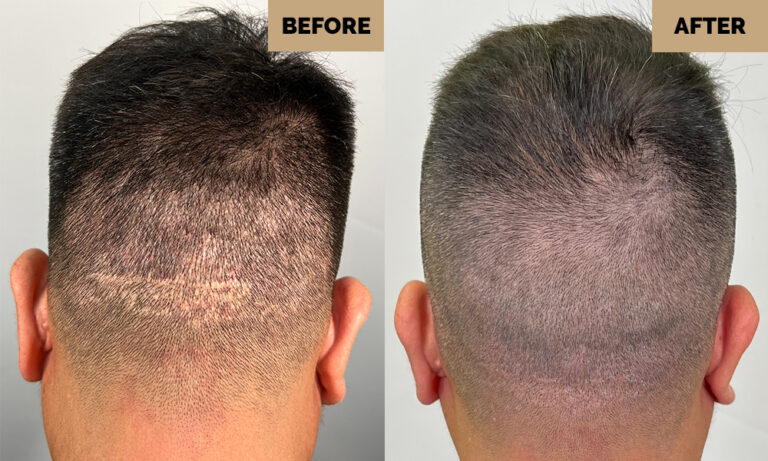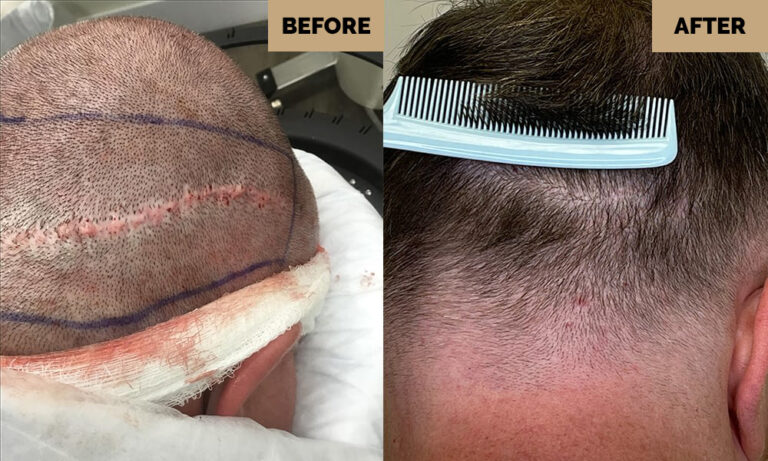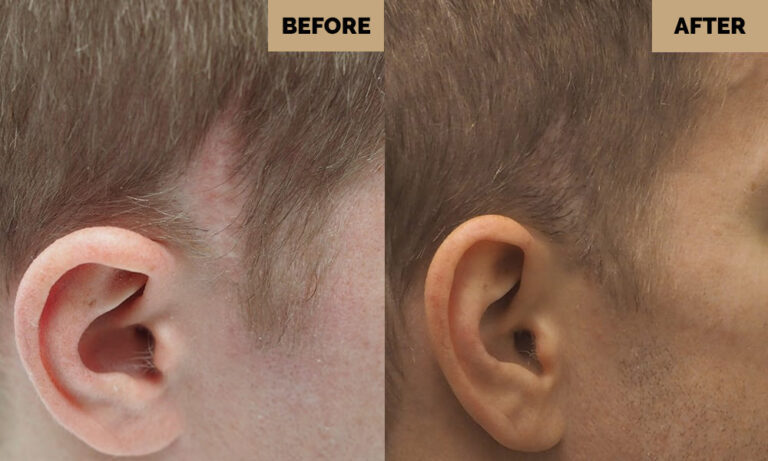The Evolution of Hair Transplant Surgery
Hair transplant techniques have come a long way since their inception. Prior to the manual follicular unit extraction (FUE) technique, the gold standard in hair restoration was the follicular unit transplantation (FUT) method, also known as strip surgery. During this procedure, surgeons would remove a strip of tissue from the back of the head and transplant the hair follicles into balding areas, typically leaving behind a scar that stretched from ear to ear.
While FUT procedures were highly effective, they left patients with a telltale sign of their surgery: a long, horizontal scar in their donor area. This scar tissue could become more noticeable if patients preferred shorter hairstyles or experienced further hair loss.
Why Do FUT Scars Develop?
Several factors contribute to the visibility of FUT scars:
- The nature of the procedure itself requires removing a strip of scalp, which must heal through natural scarring
- Tension on the wound edges during healing can lead to wider, more noticeable scars
- Individual healing characteristics and genetic factors affect scar formation
- The size of the original strip and closure techniques impact final scar appearance
A Growing Need for FUT Scar Repair
As hair transplants evolved toward more refined approaches like the manual FUE method, we’ve seen an increasing number of patients seeking solutions for their existing FUT scars. Before 2010, most hair transplant procedures were performed using the FUT method, leaving a significant number of patients with visible scarring. Fortunately, there are more options than ever for addressing these concerns thanks to advanced FUT scar repair techniques.
At Hair By Dr. Max, Restoration Center, we’ve developed sophisticated approaches to scar repair that combine multiple modalities for optimal results. Dr. Max’s singular focus on hair restoration procedures has allowed him to perfect these techniques, offering patients real solutions for concerns that many thought they would have to live with permanently.
Scar Repair Techniques at Hair By Dr. Max
At Hair By Dr. Max, we understand that every scar is unique and may require different approaches for optimal repair. Dr. Max has developed a comprehensive suite of treatments that can be used individually or in combination to address hair transplant scars effectively.
FUE Scar Repair
Manual FUE techniques can be used to transplant hair follicles directly into scarred tissue. During this procedure, healthy hair follicles are harvested one by one from a suitable donor site without the need to remove a strip of skin. They are then used to camouflage the linear scar along the back of the scalp. This meticulous approach allows for:
- Natural hair growth within the scarred area
- No additional visible scarring
- Permanent concealment of FUT scars
Typically, Dr. Max will use a punch to create round incisions in the scar to help reduce any surface tension that may be exerted by the scar tissue on the graft. For optimal results, Dr. Max carefully considers factors such as orientation, direction and angle for the transplanted hair follicles. This attention to detail ensures the most natural-looking outcome possible.
Scalp Micropigmentation (SMP)
Scalp micropigmentation, sometimes called a “hair tattoo,” involves depositing medical-grade ink directly into the skin to create the appearance of increased hair density. This same technique can also be used to reduce the visibility of FUT transplant scars by:
- Breaking up the visible line of the scar
- Helping the scarred tissue blend in with the surrounding area
- Providing immediate and long-lasting results
Dr. Maxim often combines both FUE and SMP methods to achieve optimal results, particularly for patients with wider or more noticeable scars.
Concentrated Growth Factors
Growth factors therapy is a powerful tool for reducing the appearance of transplant scars. Dr. Max frequently recommends undergoing growth factors prior to FUE scar repair, as it can significantly improve graft survival rates and overall healing. This process involves:
- Drawing a small amount of your blood
- Processing it to separate the growth factors and platelets
- Injecting it into the treatment area
This approach promotes healing and helps improve the typically less vascular environment of scar tissue, creating better conditions for transplanted follicles to thrive.
Hyperbaric Oxygen Therapy (HBOT)
To further support healing after scar repair procedures, Dr. Max also offers hyperbaric oxygen therapy. While HBOT may not directly affect old scar tissue, it plays a crucial role in optimizing recovery following surgical procedures and scar repair. HBOT works by:
- Promoting the formation of new blood vessels
- Accelerating the healing process
- Supporting the survival of newly transplanted hair follicles
When combined with other repair techniques, HBOT can enhance overall results by creating optimal conditions for tissue regeneration and graft survival.
Which FUT Scar Repair Technique Is Right for Me?
Dr. Max understands that successful scar repair often requires a multi-modal approach. During your consultation, he will carefully evaluate your needs and develop a customized treatment plan that may incorporate several techniques. Factors he considers include:
- The width and length of your existing scar
- The quality and elasticity of the surrounding tissue
- Your hair characteristics and density
- Your lifestyle and aesthetic goals
Our experience has shown that combining various approaches often yields the best and most satisfying results. For instance, we might recommend a series of growth factors treatments before FUE grafting, followed by strategic SMP for optimal scar concealment. Through the skillful application of these advanced techniques, Dr. Max has helped numerous patients overcome the visible reminders of previous hair transplant procedures.
How Does It Work?
01
Consultation

02
Scar Repair Procedure
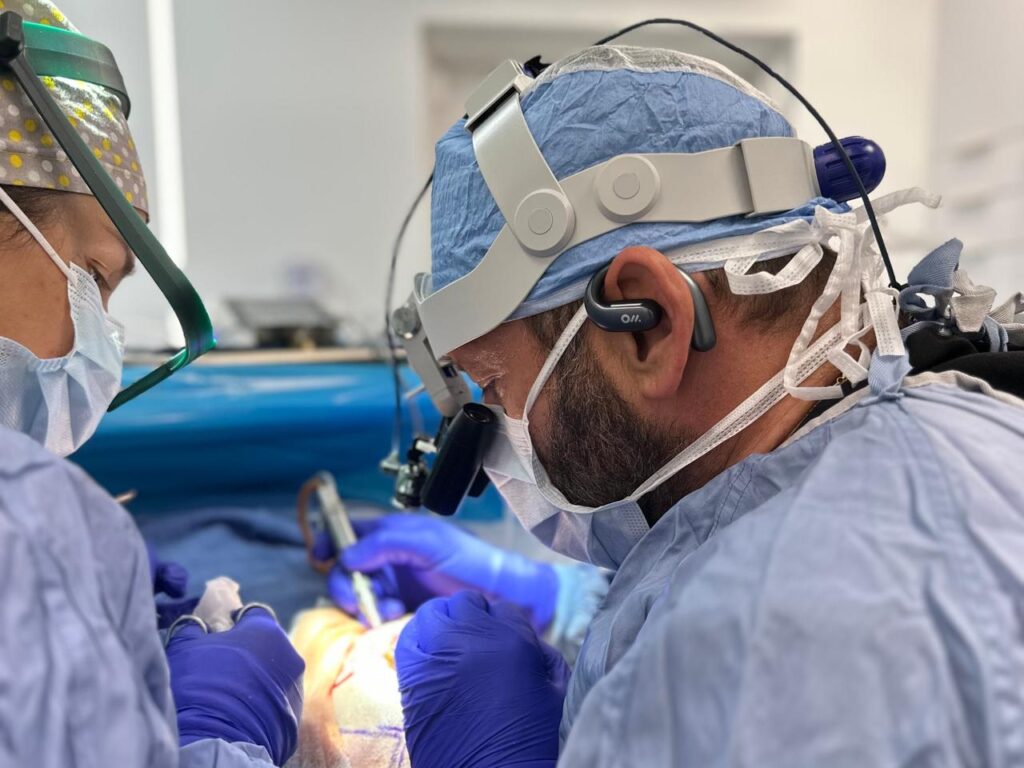
03
Scar Repair Recovery & Results
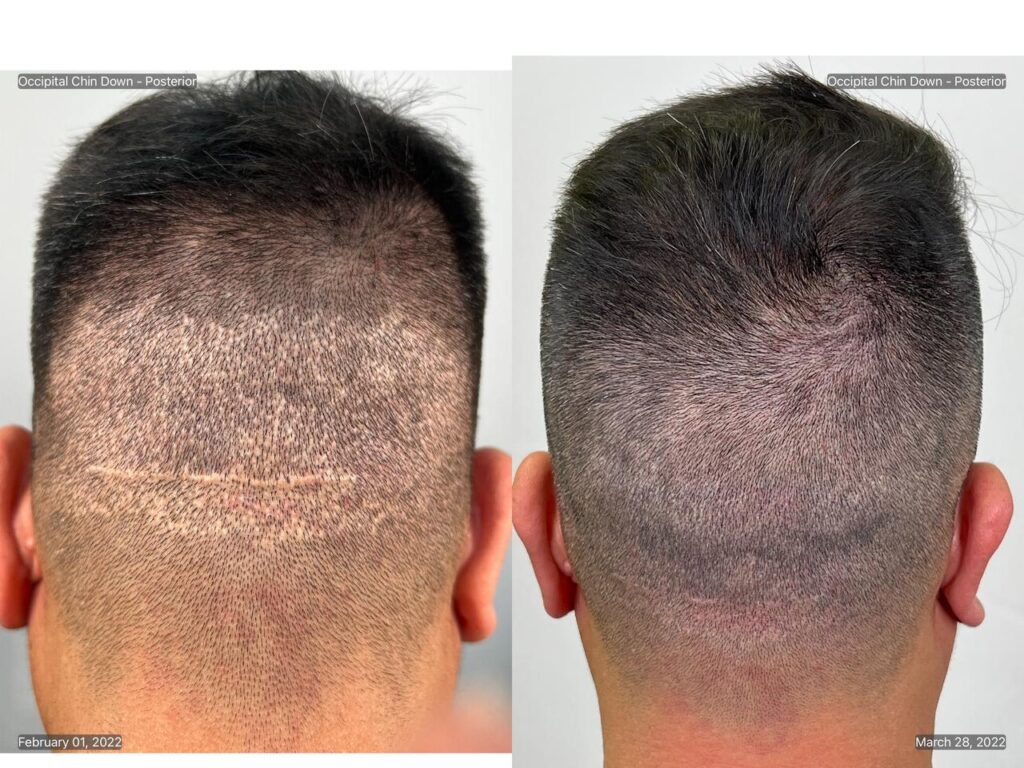
Aftercare Guidelines & Follow-Up Care
Recovery from scar repair treatment requires careful attention to post-procedure instructions. During the first 48 hours, you’ll want to keep your head elevated, even while sleeping, to minimize swelling. Minor discomfort is normal and can be managed with prescribed medications, though most patients find over-the-counter pain relievers sufficient.
Gentle cleaning of the treated area begins the day after your procedure, following our specific instructions for technique and products. Dr. Maxim recommends avoiding direct water pressure on the scalp for the first week and refraining from rigorous exercise for at least 14 days.
The transplanted area may develop small crusts around the grafts, which typically shed within seven to 10 days. This process is natural and shouldn’t cause concern. While you might notice some initial shedding of transplanted hair after a few weeks, this too is normal — new growth will begin around the three-month mark.
Dr. Max and his team are committed to the success of your FUT scar repair treatment. We provide regular follow-up appointments and carefully document your progress. Our team will also be available to answer questions and provide guidance as your results develop, in addition to offering recommendations for long-term maintenance to ensure your results last.
Why Consider Hair Transplant Scar Repair?
Is Scar Repair Limited to FUT Procedures?
We don’t just limit our scalp scar repair services to past FUT-related procedures. We truly want our patients to feel the best they can when they come to us for hair transplant scar repair in Florida. Thus, we extend our treatment of post-surgical scalp scar deformity regardless of what was the cause of the scar. This can range from trauma, past facelift surgeries, etc. If you have any questions regarding your specific situation, feel free to contact us at 954-945-2909.
Meet Dr. Max: A Leader in Hair Transplant Procedures
When it comes to hair transplantation and scar repair, experience matters. Dr. Max brings years of medical training and precision to every procedure he performs. Not only is he a board-certified hair transplant surgeon, he also has a background as an ICU and OR registered nurse and U.S. Army physician. Since 2016, he has focused exclusively on hair restoration, perfecting his techniques and advancing the field through research and innovation.
Unlike many hair restoration practices, Dr. Max only takes one patient per day and personally performs every step of each procedure himself. This dedication to personalized care ensures that every individual receives his complete attention throughout the entire hair transplant and scar repair process. As a voting member and presenting faculty at the International Society of Hair Restoration Surgery (ISHRS), he regularly shares his expertise at international conferences and serves as a principal investigator for cutting-edge hair restoration technologies.
FUT Scar Repair Patient Results
Take the Next Step at Hair By Dr. Max
A consultation with our patient care coordinator is free and private. This is a great opportunity for you to learn more about the various male hair loss treatment options available at Hair By Dr. Max, Restoration Center and have all your questions thoroughly answered. To get started, call our office in Fort Lauderdale, Florida, at 954-945-2909 or request a consultation online.
FAQs About FUT Scar Repair
How Long Does Scar Repair Treatment Take?
A typical scar repair procedure takes several hours to complete, but this can vary depending on the size of the scar and the chosen treatment method. While FUE grafting requires more time, procedures like SMP can often be completed in shorter sessions. Dr. Max schedules only one patient per day to ensure each case receives his complete attention and optimal care.
When Can I Repair My FUT Scar?
Most patients should wait at least 12 months after their original FUT procedure before pursuing scar repair. This allows the scar tissue to fully mature and stabilize. However, preliminary treatments like growth factors therapy or HBOT can sometimes begin earlier to improve the tissue quality in preparation for repair procedures.
How Much Does Scar Repair Cost?
The cost of scar repair varies from patient to patient depending on factors like the length and width of the scar, the number of grafts needed and whether combination treatments are required. During your consultation, we’ll provide a detailed cost breakdown based on your specific needs.
Will the Repair Process Result in Additional Scarring?
When using FUE and/or SMP for scar repair, any new marks are tiny dots that become virtually undetectable once healed. Dr. Max’s precise approach minimizes additional scarring, and his strategic placement ensures that even these minimal marks blend naturally with your hair.
What If I Want to Keep My Hair Short?
Our approach to FUT scar repair can often achieve results that allow you to wear shorter hairstyles with confidence. Dr. Max pays special attention to graft placement and density patterns to ensure natural-looking results even with closely cropped styles.
What’s Included in My Scar Repair Treatment?
Your scar repair treatment includes more than just the procedure itself. To optimize your results, we include two complimentary growth factors treatments as part of your package. We also offer all hair transplant patients lifetime access to 50% discounts on future growth factors and SMP treatments. This comprehensive approach helps ensure the best possible long-term outcomes for our patients.

